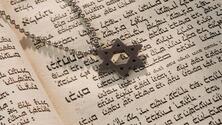
by Elisheva, a Reform convert
I completed my beit din in July of 2020. The ceremony occurred, rather strangely, via Zoom with 3 clergy members on video. The clergy agreed that there is no practical way to have the mikvah amid Covid restrictions, so that part will be scheduled later.
Prior to my conversion, I had visited several synagogues and attended Shabbat and other events, including almost a full cycle of holidays, mostly at Temple Sinai in Oakland, CA. My exploration confirmed to me that I felt most at home and in synch with Temple Sinai. Before the shelter in place, I met regularly with a rabbi there on my path to conversion.
The Hebrew name I selected reflects and honors a connection to my grandmother, the person I was closest to while growing up. I like knowing that I now have this Jewish name as a foundation.
Following is the essay I prepared for the ceremony.
My Thoughts on Becoming Jewish
By Elisheva
It’s intensely significant & emotional to have found the spiritual place where I belong. Taking this step feels right, in my mind and in my heart. I am fully embracing what is truly within me. It took years, and a winding path, to get here, which I’ll share briefly. In 2019, a specific thought came to me. I can’t recall hearing this anywhere else, but it appeared clearly in my mind: These threads were always within me, waiting to be woven.
In 2019, my longtime but casual affinity for the Jewish faith nudged me onto a deeper path. I began attending Temple Sinai in Oakland. After awhile, I started meeting with Rabbi Yoni Regev to formally adopt Judaism as my faith.
Throughout 2019, I attended Shabbat regularly and went to other events, including Temple Sinai’s High Holy Days. I attended a few events at other synagogues, which were positive, but I felt Sinai was the best fit. Sometimes at Temple Sinai I have felt an intense sensation and the hairs on my arms actually stand up – something is telling me I am in the right place.
Being restricted by the Covid pandemic is very difficult. I am introverted and need quiet time, but I also need to be with people. This imposed “virtual” world can be lonely. It’s triggered painful flashbacks to growing up in a disengaged and silent family. I’m grateful for the ways you [the clergy of Temple Sinai] are working to maintain connections. I “attend” Shabbat online and am in my 4th Hebrew class via Zoom. I appreciate Dawn Kepler and Linda Burnett – their steady outreach has been vital.
Some background: I grew up in a small town in Michigan, a country kid. My backyard was 54 acres and my grandparents next door had the remnants of a farm. My family attended a Methodist church in the “big city” (Ann Arbor). My Mom was sincerely Christian; for my Dad it was merely perfunctory. For my brother it provided a social outlet. For me, it never jibed. Jesus most likely existed historically as a person, but even from an early age I never accepted the Christian beliefs. (I respect Christians; the precepts just didn’t feel right to me). Also, I resented being forced to attend. I didn’t want to be there because I knew my heart wasn’t in it. Those experiences probably discouraged me from a spiritual pursuit for a long time.
Through college and beyond, I always had Jewish friends. I attempted to find a spiritual path. However, I guess I thought people either “were or weren’t Jewish” and I didn’t venture into exploring Judaism back then. A few times, I went to a Unitarian church, which was like a series of interesting lectures, but not a religious experience. Life went on. I graduated from college, moved to California, survived cancer, pursued my career and my creative passions.
But things happen for a reason. “When the student is ready, the teacher appears” and when I finally made it to Shabbat at Temple Sinai, it was the right time. Wondering why I didn’t do this 10, or 20, or 30 years ago is pointless. You are where you are. I’m not the only one to find Judaism later in life.
I feel a deep empathy for the roots of Judaism. I feel very humble and respectful about the history, absolutely sickened at the oppression and hardship imposed on this People. Any decent human being mourns the unfathomable evil of the Holocaust; how could this be? An alarming hostility continues today, sometimes a subtle undercurrent, sometime blatant and violent. Yet the Jewish people have endured, ever rekindling a deep appreciation of relationship, tradition, worship and joy. I didn’t grow up Jewish – and all I can do now is learn, participate and keep building a relationship to this community for the rest of my life.
One element I especially appreciate is Judaism’s acknowledgment that God’s essence can be perceived and yet at the same time, God can be unknown or undefined. Judaism is OK with that; in fact, it relishes confrontation with the mystery. To me, that signals intellectual bravery and honesty.
Paraphrased from God Was Not in the Fire by Rabbi Daniel Gordis: Jewish life is interested not in proving God’s existence, but in feeling God’s presence.
Einstein spoke of things “beyond the edge of human comprehension…” To me, that is where God is.
I believe that the ideas and words expressed in the Torah came together from divine revelation, yet God is beyond human language. The entire Hebrew Bible is a treasure to be studied and examined. Interpretations can vary without invalidating the essential truth.
How is Judaism affecting my life? I’m more aware of the need to engage in tikkun olam – learning, helping, being active. I’m more aware of the power of a community. I love to study the Siddur and learn more about Hebrew. I want to bring Jewish events and people even more into my life.
I pray that our community spaces will reopen because I think that is essential. We’re not meant to live online.
To summarize, my journey into Judaism continues. It is oftentimes joyful but also reverential, and something I do not take lightly. It is a serious pursuit with deep layers. It is intricate and yet fundamentally simple at its most primary core.

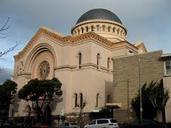

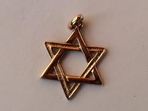
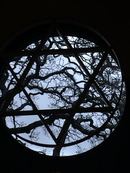
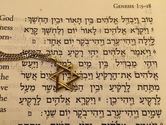
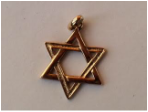
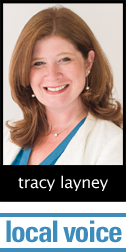

 RSS Feed
RSS Feed